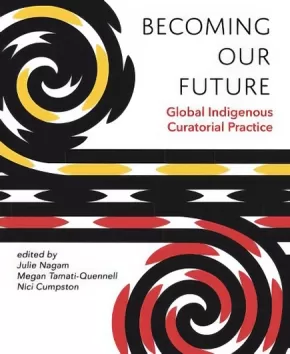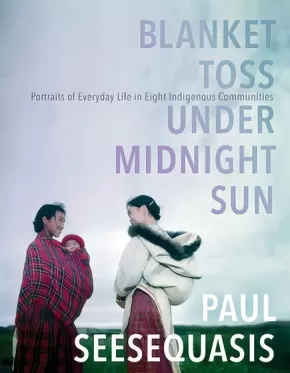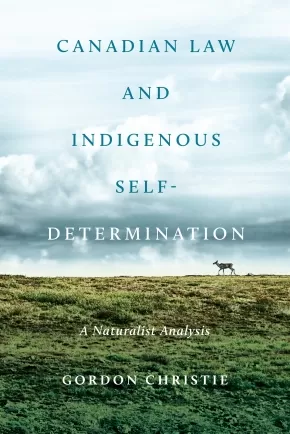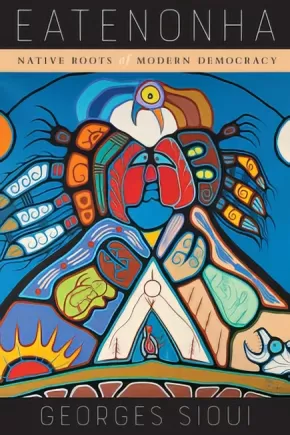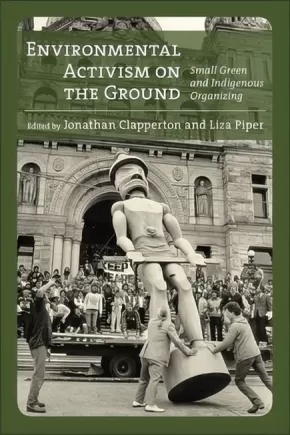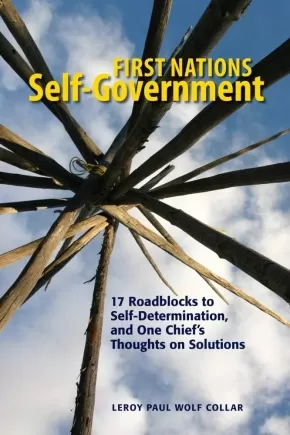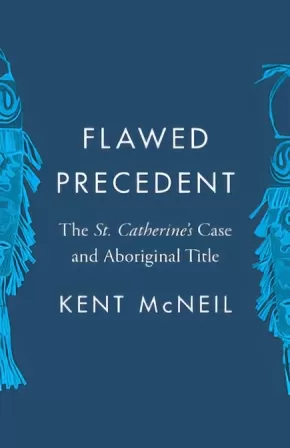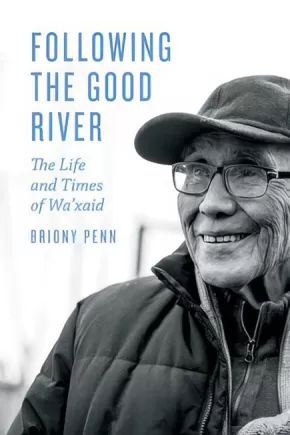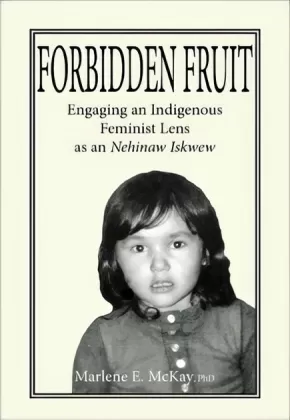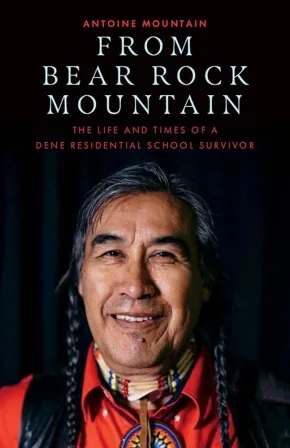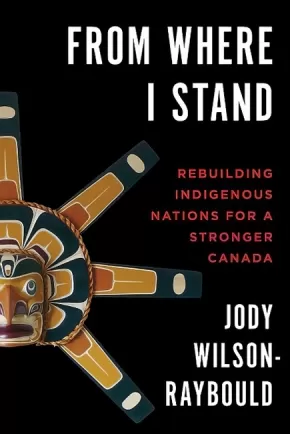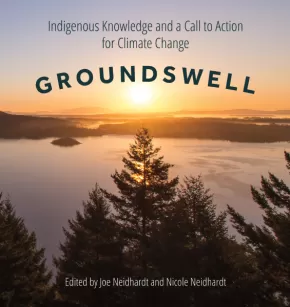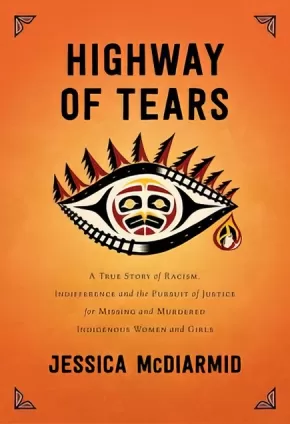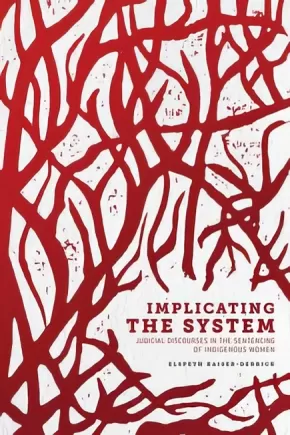
Indigenous Peoples in Canada
376
-
390
of
564 Results;
Sort By
Go To
of 38
Becoming Our Future: Global Indigenous Curatorial Practice
$40.00
Editors:
Format:
Paperback
Text Content Territories:
Indigenous Canadian; Indigenous Australian; Indigenous New Zealander;
Grade Levels: University/College;
ISBN / Barcode: 9781927886229
Synopsis:
Synopsis:
This book investigates international Indigenous methodologies in curatorial practice from the geographic spaces of Canada, Aotearoa (New Zealand) and Australia. From a perspective of Indigenous peoples important place within society, this collection explores how Indigenous art and culture operate within and from a structural framework that is unique and is positioned outside of the non-Indigenous cultural milieu.
Through a selection of contributions, Becoming Our Future articulates this perspective, defines Indigenous curatorial practice and celebrates Indigenous sovereignty within the three countries. It begins to explore the connections and historical moments that draw Indigenous curatorial practices together and the differences that set them apart. This knowledge is grounded in continuous international exchanges and draws on the breadth of work within the field. Contributors include Nigel Borell, Nici Cumpston, Freya Carmicheal, Karl Chitham, Franchesca Cubillo, Léuli Eshraghi, Reuben Friend, Heather Igloliorte, Jaimie Isaac, Carly Lane, Michelle LaVallee, Cathy Mattes, Bruce McLean, Lisa Myers, Julie Nagam, Jolene Rickard, Megan Tamati-Quennell, and Daina Warren.
Educator Information
Becoming our Future: Global Indigenous Curatorial Practice is a co-publication based on the three-year Tri-Nations International Indigenous Curators' Exchange, and was a joint initiative between the Australia Council for the Arts, Canada Council for the Arts and Creative New Zealand. It features artists and the curatorial perspectives of Indigenous curators from Canada, Australia and New Zealand.
Additional Information
228 pages | 6.25" x 9.25"
Blanket Toss Under Midnight Sun: Portraits of Everyday Life in Eight Indigenous Communities
$32.95
Format:
Paperback
Text Content Territories:
Indigenous Canadian; First Nations; Inuit; Métis;
ISBN / Barcode: 9780735273313
Synopsis:
Synopsis:
A revelatory portrait of eight Indigenous communities from across North America, shown through never-before-published archival photographs--a gorgeous extension of Paul Seesequasis's popular social media project.
In 2015, writer and journalist Paul Seesequasis found himself grappling with the devastating findings of Canada's Truth and Reconciliation Commission report on the residential school system. He sought understanding and inspiration in the stories of his mother, herself a residential school survivor. Gradually, Paul realized that another, mostly untold history existed alongside the official one: that of how Indigenous peoples and communities had held together during even the most difficult times. He embarked on a social media project to collect archival photos capturing everyday life in First Nations, Métis and Inuit communities from the 1920s through the 1970s. As he scoured archives and libraries, Paul uncovered a trove of candid images and began to post these on social media, where they sparked an extraordinary reaction. Friends and relatives of the individuals in the photographs commented online, and through this dialogue, rich histories came to light for the first time.
Blanket Toss Under Midnight Sun collects some of the most arresting images and stories from Paul's project. While many of the photographs live in public archives, most have never been shown to the people in the communities they represent. As such, Blanket Toss is not only an invaluable historical record, it is a meaningful act of reclamation, showing the ongoing resilience of Indigenous communities, past, present--and future.
In 2015, writer and journalist Paul Seesequasis found himself grappling with the devastating findings of Canada's Truth and Reconciliation Commission report on the residential school system. He sought understanding and inspiration in the stories of his mother, herself a residential school survivor. Gradually, Paul realized that another, mostly untold history existed alongside the official one: that of how Indigenous peoples and communities had held together during even the most difficult times. He embarked on a social media project to collect archival photos capturing everyday life in First Nations, Métis and Inuit communities from the 1920s through the 1970s. As he scoured archives and libraries, Paul uncovered a trove of candid images and began to post these on social media, where they sparked an extraordinary reaction. Friends and relatives of the individuals in the photographs commented online, and through this dialogue, rich histories came to light for the first time.
Blanket Toss Under Midnight Sun collects some of the most arresting images and stories from Paul's project. While many of the photographs live in public archives, most have never been shown to the people in the communities they represent. As such, Blanket Toss is not only an invaluable historical record, it is a meaningful act of reclamation, showing the ongoing resilience of Indigenous communities, past, present--and future.
Reviews
“A revelatory work of astonishing grace, Blanket Toss Under Midnight Sun encapsulates an invisible generation brought to glorious life. So many times, the subject could have been my auntie, cousin or grandmother. When people ask why I live on the rez, I’ll point them to this book, this stunning reclamation of narrative, which so movingly shows the love of place, community and self.” —Eden Robinson
“A revelatory work of astonishing grace, Blanket Toss Under Midnight Sun encapsulates an invisible generation brought to glorious life. So many times, the subject could have been my auntie, cousin or grandmother. When people ask why I live on the rez, I’ll point them to this book, this stunning reclamation of narrative, which so movingly shows the love of place, community and self.” —Eden Robinson
“Paul Seesequasis's Blanket Toss Under Midnight Sun is a wonderful collection of found photographs and recovered histories that link us to a past as old as the land and as precious as breath.” —Thomas King, author of The Inconvenient Indian
Additional Information
192 pages | 7.08" x 9.03" | Colour photos throughout
Canadian Law and Indigenous Self‐Determination: A Naturalist Analysis
$49.95
Format:
Paperback
Text Content Territories:
Indigenous Canadian;
Grade Levels: University/College;
ISBN / Barcode: 9781442628991
Synopsis:
Synopsis:
For centuries, Canadian sovereignty has existed uneasily alongside forms of Indigenous legal and political authority. Canadian Law and Indigenous Self-Determination demonstrates how, over the last few decades, Canadian law has attempted to remove Indigenous sovereignty from the Canadian legal and social landscape. Adopting a naturalist analysis, Gordon Christie responds to questions about how to theorize this legal phenomenon, and how the study of law should accommodate the presence of diverse perspectives. Exploring the socially-constructed nature of Canadian law, Christie reveals how legal meaning, understood to be the outcome of a specific society, is being reworked to devalue the capacities of Indigenous societies.
Addressing liberal positivism and critical postcolonial theory, Canadian Law and Indigenous Self-Determination considers the way in which Canadian jurists, working within a world circumscribed by liberal thought, have deployed the law in such a way as to attempt to remove Indigenous meaning-generating capacity.
Reviews
"Thought-provoking and robust, Canadian Law and Indigenous Self-Determination is likely to be a flag-ship in theorizing on indigenous-state relations. Gordon Christie situates himself squarely within the debates he describes and critiques, something that few legal theorists attempt. This book is remarkable in its originality and in my view a triumph." - Kirsty Gover, Melbourne School of Law, The University of Melbourne
"Clearly and carefully argued, Canadian Law and Indigenous Self-Determination is an original, analytically incisive, and important contribution to our understanding of the development of Aboriginal rights by the courts since 1982." - James Tully, Emeritus Distinguished Professor of Political Science, Law and Philosophy, University of Victoria
Educator Information
Table of Contents
Introduction: A Journey in Making Sense
1. Setting the Stage
2. Canadian Law and Its Puzzles
3. Differing Understandings and the Way Forward
4. Remarks on Theorizing and Method
5. Problems with Theorizing About the Law
6. Liberal Positivism and Aboriginal Rights: Defining and Establishing ‘Existing’ Rights
7. Liberal Positivism and Aboriginal Rights: Making Sense of the Place of Aboriginal Rights in Canada
8. Postcolonial Theory and Aboriginal Law
Conclusion
Bibliography
Texts
Articles
Additional Information
528 pages | 6.00" x 9.00"
Eatenonha: Native Roots of Modern Democracy
$39.95
Format:
Hardcover
Text Content Territories:
Indigenous Canadian; First Nations; Huron-Wendat (Ouendat); Seawi Clan;
ISBN / Barcode: 9780773556393
Synopsis:
Synopsis:
An exploration of the historical and future significance of Canada's Native soul.
Eatenonha is the Wendat word for love and respect for the Earth and Mother Nature. For many Native peoples and newcomers to North America, Canada is a motherland, an Eatenonha - a land in which all can and should feel included, valued, and celebrated.
In Eatenonha Georges Sioui presents the history of a group of Wendat known as the Seawi Clan and reveals the deepest, most honoured secrets possessed by his people, by all people who are Indigenous, and by those who understand and respect Indigenous ways of thinking and living. Providing a glimpse into the lives, ideology, and work of his family and ancestors, Sioui weaves a tale of the Wendat's sparsely documented historical trajectory and his family's experiences on a reserve. Through an original retelling of the Indigenous commercial and social networks that existed in the northeast before European contact, the author explains that the Wendat Confederacy was at the geopolitical centre of a commonwealth based on peace, trade, and reciprocity. This network, he argues, was a true democracy, where all beings of all natures were equally valued and respected and where women kept their place at the centre of their families and communities.
Identifying Canada's first civilizations as the originators of modern democracy, Eatenonha represents a continuing quest to heal and educate all peoples through an Indigenous way of comprehending life and the world.
Reviews
"Eatenonha is a unique interweaving of self, family, First Nation, and Indigenous peoples of the Americas and elsewhere." - John Steckley, Humber College
Educator Information
Recommended in the Canadian Indigenous Books for Schools 2020/2021 resource list for grades 10 to 12 for use in these areas: English Language Arts and Social Studies.
Additional Information
200 pages | 6.00" x 9.00"
Environmental Activism on the Ground: Small Green and Indigenous Organizing
$39.99
Editors:
Format:
Paperback
Text Content Territories:
Indigenous American; Indigenous Canadian;
Grade Levels: 12; University/College;
ISBN / Barcode: 9781773850047
Synopsis:
Synopsis:
Environmental Activism on the Ground draws upon a wide range of interdisciplinary scholarship to examine small scale, local environmental activism, paying particular attention to Indigenous experiences. It illuminates the questions that are central to the ongoing evolution of the environmental movement while reappraising the history and character of late twentieth and early twenty-first environmentalism in Canada, the United States, and beyond.
This collection considers the different ways in which Indigenous and non-Indigenous activists have worked to achieve significant change. It examines attempts to resist exploitative and damaging resource developments, and the establishment of parks, heritage sites, and protected areas that recognize the indivisibility of cultural and natural resources. It pays special attention to the thriving environmentalism of the 1960s through the 1980s, an era which saw the rise of major organizations such as Greenpeace along with the flourishing of local and community-based environmental activism.
Environmental Activism on the Ground emphasizes the effects of local and Indigenous activism, offering lessons and directions from the ground up. It demonstrates that the modern environmental movement has been as much a small-scale, ordinary activity as a large-scale, elite one.
Reviews
"Environmental Activism on the Ground succeeds splendidly in complicating and enriching our understanding of modern environmentalism. Focusing on Indigenous and non-Indigenous activists in an impressive range of settings, Jonathan Clapperton and Liza Piper draw together and interpret diverse methodological and conceptual insights in a way that gives new, deserved prominence to those who have strived—and continue to strive—for environmental justice at the local level. These accounts left me both enlightened and heartened. Scholars from across the humanities and social sciences will welcome this volume." - Richard A. Rajala, Department of History, University of Victoria.
Educator Information
Table of Contents:
Illustrations
Acknowledgments
Introduction: In the Shadow of the Green Giants: Environmentalism and Civic Engagements - Jonathan Clappeton & Liza Piper
Part 1: Processes and Possibilities
1. Strategies for Survival: First Nations Encounters with Environmentalism - Anna J. Willow
2. Native/Non-Native Alliances: Challenging Fossil Fuel Industry Shipping at Pacific Northwest Ports - Zoltán Grossman
3. Conserving Contested Ground: Soverigenty-Driven Stewardship by the White Mountain Apache Tribe and the Fort Apache Heritage Foundation - Jon R. Welch
4. From Southern Alberta to Northern Brazil: Indigenous Conservation and the Preservation of Cultural Resources - Sterling Evans
5. Parks For and By the People: Acknowledging Ordinary People in the Formation, Protection, and Use of State and Provincial Parks - Jesica M. DeWitt
Part 2: Histories
6. Alternatives: Environmental and Indigenous Activism in the 1970s - Liza Piper
7. Marmion Lake Generating Station: Another Northern Scandal? - Tobasonakwut Peter Kinew
8. Environmental Activism as Anti-Conquest: The Nuu-chah-nulth and Environmentalists in the Contact Zone of Clayoquont Sound - Jonathan Clapperton
9. Local Economic Independence as Environmentalism: Nova Scotia in the 1970s - Mark Leeming
10. “Not an Easy Thing to Implement”: The Conservation Council of New Brunswick and Environmental Organization in a Resource-Dependent Province, 1969-1983 - Mark J. McLaughlin
11. The Ebb and Flow of Local Environmental Activism: The Society for Pollution and Environmental Control (SPEC), British Columbia - Jonathan Clapperton
12: From Scoieal Movement to Environmental Behemoth: How Greenpeace Got Big - Frank Zelko
Afterword: Lessons from the Ground Up - Jonathan Clapperton & Liza Piper
Bibliography
List of Contributors
Index
Additional Information
752 pages | 6.00" x 9.00"
Authenticity Note: Because this work includes contributions from Indigenous peoples, it has been labelled as containing Authentic Indigenous Text.
First Nations Self-Government: 17 Roadblocks, and One Chief's Thoughts on Solutions
$24.95
Format:
Paperback
Text Content Territories:
Indigenous Canadian; First Nations; Blackfoot Confederacy (Siksikaitsitapi); Siksika (Blackfoot);
Grade Levels: University/College;
ISBN / Barcode: 9781550598216
Synopsis:
Synopsis:
Indigenous Peoples in Canada are continuing to assert their right to self-determination in this era of reconciliation. While dozens of Indigenous communities have signed varying forms of self-government agreements with the federal government, Indigenous Nations still face many obstacles along the path to true self-determination.
As a former Chief of Siksika Nation in southern Alberta, Leroy Wolf Collar dealt with many of the same problems other Indigenous Nations face across the country. From serious housing shortages to the lack of opportunities for youth, Chief Wolf Collar experienced the challenges and frustrations that come from operating in a colonial system still constrained by the Indian Act.
How do Indigenous Peoples move on from this defective system? Chief Wolf Collar identifies 17 issues that currently hinder Indigenous Nations—including broken treaty promises, problems with common forms of band administration, and the intrusion of provincial governments—along with potential solutions to overcome them.
This guide is for current and aspiring Indigenous leaders who want to increase their understanding of good governance, management, and leadership, as well as those who want to explore issues around Indigenous self-determination in Canada.
Educator Information
Recommended in the Canadian Indigenous Books for Schools 2020/2021 resource list for grades 11 and 12 for use in these areas: Law, English Language Arts, and Social Studies.
Additional Information
128 pages | 6.00" x 9.00"
Flawed Precedent: The St. Catherine's Case and Aboriginal Title
$27.95
Format:
Paperback
Text Content Territories:
Indigenous Canadian; First Nations; Anishinaabeg; Ojibway; Saulteaux;
Grade Levels: University/College;
ISBN / Barcode: 9780774861069
Synopsis:
Synopsis:
In 1888, the Judicial Committee of the Privy Council in London ruled in St. Catherine’s Milling and Lumber Company v. The Queen, a case involving the Saulteaux people’s land rights in Ontario. This precedent-setting case would define the legal contours of Aboriginal title in Canada for almost a hundred years, despite the racist assumptions about Indigenous peoples at the heart of the case.
In Flawed Precedent, preeminent legal scholar Kent McNeil thoroughly investigates this contentious case. He begins by delving into the historical and ideological context of the 1880s. He then examines the trial in detail, demonstrating how prejudicial attitudes towards Indigenous peoples and their use of the land influenced the decision. He also discusses the effects that St. Catherine’s had on Canadian law and policy until the 1970s when its authority was finally questioned by the Supreme Court in Calder, then in Delgamuukw, Marshall/Bernard, Tsilhqot’in, and other key rulings.
McNeil has written a compelling and illuminating account of a landmark case that influenced law and policy on Indigenous land rights for almost a century. He also provides an informative analysis of the current judicial understanding of Aboriginal title in Canada, now driven by evidence of Indigenous law and land use rather than by the discarded prejudicial assumptions of a bygone era.
This book is vital reading for everyone involved in Aboriginal law or title, legal historians and scholars, and anyone interested in Indigenous rights in Canada.
Additional Information
224 pages | 5.50" x 8.50" | 10 b&w photos, 4 maps
Following the Good River: The Life and Times of Wa'xaid
$38.00
Format:
Hardcover
Text Content Territories:
Indigenous Canadian; First Nations; Haisla (Kitamaat); Xenaksiala (Henaksiala);
ISBN / Barcode: 9781771603218
Synopsis:
Synopsis:
Based on recorded interviews and journal entries this major biography of Cecil Paul (Wa’xaid) is a resounding and timely saga featuring the trials, tribulations, endurance, forgiveness, and survival of one of North American’s more prominent Indigenous leaders.
Born in 1931 in the Kitlope, Cecil Paul, also known by his Xenaksiala name, Wa’xaid, is one of the last fluent speakers of his people’s language. At age ten he was placed in a residential school run by the United Church of Canada at Port Alberni where he was abused. After three decades of prolonged alcohol abuse, he returned to the Kitlope where his healing journey began. He has worked tirelessly to protect the Kitlope, described as the largest intact temperate rainforest watershed in the world. Now in his late 80s, he resides on his ancestors’ traditional territory.
Following upon the success of Wa'xaid's own book of personal essays, Stories from the Magic Canoe, Briony Penn's major biography of this remarkable individual will serve as a timely reminder of the state of British Columbia's Indigenous community, the environmental and political strife still facing many Indigenous communities, and the philosophical and personal journey of a remarkable man.
Additional Information
376 pages | 6.00" x 9.00"
Forbidden Fruit: Engaging an Indigenous Feminist Lens as an Nehinaw Iskwew (4 in Stock, Out of Print)
$23.00
Format:
Paperback
Text Content Territories:
Indigenous Canadian; First Nations; Cree (Nehiyawak); Swampy Cree ;
Grade Levels: University/College;
ISBN / Barcode: 9781926476254
Synopsis:
Synopsis:
Forbidden Fruit: Engaging an Indigenous Feminist Lens as an Neninaw Iskwew is a feminist based memoir acknowledging that people are measured, categorized, and placed in a hierarchal order that is deeply influenced by discourses predicated upon social processes.
Dr. McKay’s Indigenous feminism is about being aware that due to the colonial patriarchy that has seeped through Indigenous social and cultural systems, Indigenous women are positioned differently in economic, social and political structures. Marlene masterfully uses her own life experiences to assert that colonialism and Indigenous cultures obscure the role of women in a way that continues both their marginalization and the binary of the princess/squaw (p. 11).
Additional Information
98 pages | 6.00" x 9.00"
From Bear Rock Mountain: The Life and Times of a Dene Residential School Survivor
$30.00
Format:
Hardcover
Text Content Territories:
Indigenous Canadian; First Nations; Dene;
ISBN / Barcode: 9781927366806
Synopsis:
Synopsis:
In this poetic, poignant memoir, Dene artist and social activist Antoine Mountain paints an unforgettable picture of his journey from residential school to art school—and his path to healing.
In 1949, Antoine Mountain was born on the land near Radelie Koe, Fort Good Hope, Northwest Territories. At the tender age of seven, he was stolen away from his home and sent to a residential school—run by the Roman Catholic Church in collusion with the Government of Canada—three hundred kilometres away. Over the next twelve years, the three residential schools Mountain was forced to attend systematically worked to erase his language and culture, the very roots of his identity.
While reconnecting to that which had been taken from him, he had a disturbing and painful revelation of the bitter depths of colonialism and its legacy of cultural genocide. Canada has its own holocaust, Mountain argues.
As a celebrated artist and social activist today, Mountain shares this moving, personal story of healing and the reclamation of his Dene identity.
Educator Information
Recommended in the Canadian Indigenous Books for Schools 2019-2020 resource list as being useful for grades 9 to 12 in the following subject areas: English Language Arts, Social Studies.
Included in this story are personal stories of residential school and addiction.
Additional Information
272 pages | 5.50" x 8.50"
From Where I Stand: Rebuilding Indigenous Nations for a Stronger Canada
$24.95
Format:
Paperback
Text Content Territories:
Indigenous Canadian;
Grade Levels: 12; University/College;
ISBN / Barcode: 9780774880534
Synopsis:
Synopsis:
An Indigenous leader who has dedicated her life to Indigenous Rights, Jody Wilson-Raybould has represented both First Nations and the Crown at the highest levels. And she is not afraid to give Canadians what they need most – straight talk on what has to be done to deconstruct the colonial legacy and achieve true reconciliation in Canada.
In this powerful book, drawn from Wilson-Raybould’s speeches and other writings, she urges us all – governments, Indigenous Nations, everyone – to build upon the momentum already gained in the reconciliation process or risk hard-won progress being lost. The choice is stark: support Indigenous-led initiatives for Nation rebuilding or revert to governments just managing “the problem.” Frank and impassioned, she also argues that true reconciliation will never occur so long as governments deny Indigenous Peoples their rights and the Indian Act continues to exist. Until then, we’ll be stuck in the status quo – mired in conflicts and expensive court cases that do nothing to improve people’s lives or heal the country.
The good news is that Indigenous Nations already have the solutions. Now it is time to act and build a shared future based on the foundations of trust, cooperation, good governance, and recognition. Removing the barriers that are keeping these solutions from being put into effect will not only empower Indigenous Peoples – it will enrich all Canadians and make Canada stronger.
From Where I Stand is indispensable reading for anyone who wants to dig deeper into the reconciliation process and know what they can do to make a difference, from engaged citizens and students to leaders and policy-makers, educators and academics, and lawyers and consultants.
Reviews
"From Where I Stand is a must-read book for all Canadians. Puglaas shares a clear understanding of where we have come from, the issues we must address, and the pathways to a transformed future. Having witnessed her remarkable courage and capacity as Canada’s attorney general and her determination to do what is right without succumbing to unrelenting political pressure, Puglaas stands tall among Canadians as a person for whom truth, thoughtfulness, and principle are not mere words – but values to sustain a different kind of policy and politics." - Mary Ellen Turpel-Lafond (Aki-Kwe), Professor of Law, Allard Law School UBC, and Director of the Residential School History and Dialogue Centre
"Jody Wilson-Raybould's quest for justice has long driven her work. I first saw this when she was a law student and this commitment to justice has only been deepened by subsequent public service. Her unwavering commitment to reconciliation, balance, and good governance springs off every page of this book." - John Borrows, Canada Research Chair in Indigenous Law, University of Victoria Law School
Educator Information
Table of Contents
Foreword
Introduction
Moving through the Postcolonial Door
We Truly Have Come a Long Way ...
Idle No More and Recapturing the Spirit and Intent of the Two Row Wampum
On the Parallels, and Differences, between Canada and South Africa
Our Shared Histories and the Path of Reconciliation
Rights and Recognition
Self-Determination and the Inherent Right of Self-Government
Translating Hard-Fought-For Rights into Practical and Meaningful Benefits
UNDRIP Is the Start Not the Finishing Line
Defining the Path of Reconciliation through Section 35
Indigenous Rights Are Human Rights
Implementing UNDRIP
Governance in the Post-Indian Act World
Toppling the Indian Act Tree
First Nations Jurisdiction over Citizenship
Holding and Managing Our Lands
On Accountability and Transparency
Developing a New Fiscal Relationship
The Governance Toolkit and Building on Our Success
Building Business Relationships and the Duty to Consult
Economic Development Depends on Self-Government
First Nations Are Not a Box to Tick Off
Who Owns and Is Responsible for the Water?
On Certainty and Why It’s Elusive
Restoring Balance, Correcting Injustices, and Remaining Vigilant
A Litmus Test for Reconciliation Is the Status of Women
Preventing First Contacts with the Criminal Justice System
On Sticking Our Necks Out
On Obstruction, Denial, and Canada’s Failure to Uphold the Rule of Law
Each of Us, In Our Own Way, Is a Hiligaxste’
Acknowledgments
A Note on Terminology and the Speeches
Index
Additional Information
264 pages | 6.00" x 9.00"
Groundswell: Indigenous Knowledge and a Call to Action for Climate Change
$49.95
Artists:
Editors:
Format:
Hardcover
Text Content Territories:
Indigenous;
ISBN / Barcode: 9781771743440
Synopsis:
Synopsis:
Groundswell is a collection of stirring and passionate essays from both Indigenous and non-Indigenous writers that eloquently present a compelling message about how traditional Indigenous knowledge and practices can and must be used to address climate change. The chapters interconnect, taking us from radical thinking to the gentleness of breath, and demonstrate that we are all in this together—everyone must understand what needs to be accomplished and participate in the care of Mother Earth.
Authors tap into religious and spiritual perspectives, explore the wisdom of youth, and share the insights of a nature-based philosophy. These collective writings give you a chance to contemplate and formulate your own direction. A moral revolution that can produce a groundswell of momentum toward a diverse society based on human rights, Indigenous rights, and the rights of Mother Earth.
Beautifully illustrated with photographs, Groundswell is augmented with video recordings from the authors and a short documentary film, available on the project’s website. Profits from the book will help support the videos, documentary, and future projects of The Call to Action for Climate Change. Visit www.envisionthebigpicture.com.
Reviews
"A beautifully illustrated and highly engaging read.… Essays from both Indigenous and non-Indigenous contributors present a strong vision for how traditional knowledge can be used to fight climate change, as well as how we can work together toward a more balanced and harmonious relationship with nature." – Joan Elliott, librarian and Manager of Stewart Resources Centre
“This book shares Indigenous knowledge that can teach us to listen to and be in relationship to the Earth in a way that honours the sacredness and interdependence of all life forms. A paradigm shift, informed by Indigenous ways of knowing and acting, is crucial in this time of climate change.” – Laura Stivers, author of Disrupting Homelessness: Alternative Christian Approaches
“A powerful text that introduces a much-needed perspective on the issue of climate change.… When reading the chapter ‘Rooted: Staying Grounded Amidst a Changing Landscape’ by Nicole Neidhardt, Teka Everstz, and Gina Mowatt, I was moved by the presence of youth voices. As a young, Indigenous person myself, I felt a great power, understanding, and nuance to the voices emerging in the chapter.… Nicole Neidhardt, Teka Everstz, and Gina Mowatt asked for more than a challenge of the reader’s ideology—they screamed out for a call to action." – Forrest Goodluck, award-winning youth filmmaker who appears opposite Leonardo DiCaprio in The Revenant
“The reflections of three young Indigenous activists (‘Rooted: Staying Grounded Amidst a Changing Landscape’) … are sharp, buoyant reminders of elation and advocacy in a world of overwhelming and seemingly unlimited power: colonialism, imperialism, and industrial capitalism. These narratives bring me moral conviction and faith as we all walk hand-in-hand into our carbon wrought future.” – Kalen Goodluck, freelance documentary photographer and journalist
Educator Information
Recommended Resource for Grades 11-12 and College/University Students.
Social Studies/B.C. First Peoples/Comparative Cultures/Contemporary Indigenous Studies Curricular Concepts Explored in the Text:
- Interactions between cultures and the natural environment.
- The role of value systems and belief systems in the development of cultures.
- Varied identities and worldviews of Indigenous peoples, and the importance of the interconnection of family, relationships, language, culture, and the land.
- Factors that sustain and challenge the identities and worldviews of Indigenous peoples.
Science/Environmental Science Curricular Concepts Explored in the Text:
- First Peoples knowledge and other traditional ecological knowledge in sustaining biodiversity.
- Human actions and their impact on ecosystem integrity.
- First Peoples ways of knowing and doing.
- Resource stewardship.
English/English First Peoples Curricular Concepts Explored in the Text:
- First Peoples languages and texts reflect their cultures, knowledge, histories, and worldviews.
- Critically, creatively, and reflectively explore ideas within, between, and beyond texts.
- Construct meaningful personal connections between self, text, and world.
- The diversity within and across First Peoples societies as represented in texts.
TABLE OF CONTENTS
Preface Invocation: Using Contemplative Meditation to Foster Change
Introduction: This Is the Moral Revolution
Climate Change Snapshots by Kristen Dey
Rooted: Staying Grounded Amidst a Changing Landscape by Nicole Neidhardt, Teka Everstz, and Gina Mowatt
What You Need to Know Is Not in a Book: Indigenous Education by Larry Emerson
Illuminating the Path Forward by Erin Brillon
Stories from Our Elders by Andy Everson
Religions for the Earth by Karenna Gore
How We Can Work Together by Merle Lefkoff
Essential Elements of Change by Mary Hasbah Roessel
The Radical Vision of Indigenous Resurgence by Taiaiake Alfred
Sharing the Wealth: Bending Toward Justice by Rod Dobell
The Commonwealth of Breath by David Abram
Science, Spirituality, Justice by Larry Rasmussen
The Moral Revolution, Weaving All the Parts by Joe Neidhardt
Acknowledgements
Further References
Further Readings
Contributors
Contributors: David Abram, Taiaiake Alfred, Erin Brillon, Kristen Dey, Rod Dobell, Larry Emerson, Andy Everson, Teka Everstz, Karenna Gore, Merle Lefkoff, Gina Mowatt, Joe Neidhardt, Nicole Neidhardt, Larry Rasmussen, Mary Hasbah Roessel.
Additional Information
208 Pages | 8.5" x 9" | ISBN: 9781771743440 | Hardcover
Halfbreed: Restored Edition (2 in Stock)
$19.95
Format:
Paperback
Text Content Territories:
Indigenous Canadian; Métis;
ISBN / Barcode: 9780771024092
Synopsis:
Synopsis:
A new, fully restored edition of the essential Canadian classic.
An unflinchingly honest memoir of her experience as a Métis woman in Canada, Maria Campbell's Halfbreed depicts the realities that she endured and, above all, overcame. Maria was born in Northern Saskatchewan, her father the grandson of a Scottish businessman and Métis woman--a niece of Gabriel Dumont whose family fought alongside Riel and Dumont in the 1885 Rebellion; her mother the daughter of a Cree woman and French-American man. This extraordinary account, originally published in 1973, bravely explores the poverty, oppression, alcoholism, addiction, and tragedy Maria endured throughout her childhood and into her early adult life, underscored by living in the margins of a country pervaded by hatred, discrimination, and mistrust. Laced with spare moments of love and joy, this is a memoir of family ties and finding an identity in a heritage that is neither wholly Indigenous or Anglo; of strength and resilience; of indominatable spirit.
This edition of Halfbreed includes a new introduction written by Indigenous (Métis) scholar Dr. Kim Anderson detailing the extraordinary work that Maria has been doing since its original publication 46 years ago, and an afterword by the author looking at what has changed, and also what has not, for Indigenous people in Canada today. Restored are the recently discovered missing pages from the original text of this groundbreaking and significant work.
Additional Information
224 pages | 5.21" x 7.99"
Highway of Tears: A True Story of Racism, Indifference and the Pursuit of Justice for Missing and Murdered Indigenous Women and Girls
$21.00
Format:
Paperback
Text Content Territories:
Indigenous Canadian;
Grade Levels: University/College;
ISBN / Barcode: 9780385687591
Synopsis:
Synopsis:
A penetrating and deeply moving account of the missing and murdered Indigenous women and girls of Highway 16, and a searing indictment of the society that failed them.
For decades, Indigenous women and girls have gone missing or been found murdered along an isolated stretch of highway in northwestern British Columbia. The highway is known as the Highway of Tears, and it has come to symbolize a national crisis.
Journalist Jessica McDiarmid meticulously investigates the devastating effect these tragedies have had on the families of the victims and their communities, and how systemic racism and indifference has created a climate where Indigenous women and girls are over-policed, yet under-protected. Through interviews with those closest to the victims--mothers and fathers, siblings and friends--McDiarmid provides an intimate, first-hand account of their loss and unflagging fight for justice. Examining the historically fraught social and cultural tensions between settlers and Indigenous peoples in the region, McDiarmid links these cases to others across Canada--now estimated to number up to 4,000--contextualizing them within a broader examination of the undervaluing of Indigenous lives in the country.
Highway of Tears is a piercing exploration of our ongoing failure to provide justice for missing and murdered Indigenous women and girls, and testament to their families and communities' unwavering determination to find it.
Additional Information
352 pages | 6.00" x 9.00"
Implicating the System: Judicial Discourses in the Sentencing of Indigenous Women
$34.95
Format:
Paperback
Text Content Territories:
Indigenous Canadian;
Grade Levels: University/College;
ISBN / Barcode: 9780887558283
Synopsis:
Synopsis:
Indigenous women continue to be overrepresented in Canadian prisons; research demonstrates how their over-incarceration and often extensive experiences of victimization are interconnected with and through ongoing processes of colonization. Implicating the System: Judicial Discourses in the Sentencing of Indigenous Women explores how judges navigate these issues in sentencing by examining related discourses in selected judgments from a review of 175 decisions.
The feminist theory of the victimization-criminalization continuum informs Elspeth Kaiser-Derrick’s work. She examines its overlap with the Gladue analysis, foregrounding decisions that effectively integrate gendered understandings of Indigenous women’s victimization histories, and problematizing those with less contextualized reasoning. Ultimately, she contends that judicial use of the victimization-criminalization continuum deepens the Gladue analysis and augments its capacity to further its objectives of alternatives to incarceration.
Kaiser-Derrick discusses how judicial discourses about victimization intersect with those about rehabilitation and treatment, and suggests associated problems, particularly where prison is characterized as a place of healing. Finally, she shows how recent incursions into judicial discretion, through legislative changes to the conditional sentencing regime that restrict the availability of alternatives to incarceration, are particularly concerning for Indigenous women in the system.
Reviews
“Elspeth Kaiser-Derrick’s work is an important read in light of the needs of truth and reconciliation. Her exploration of judicial discourses in the sentencing of Indigenous women reveal the multiple systemic failures of Canada’s justice system. What judge’s say and write is important because it reflects and refracts the inequalities and injustices that are embedded in our collective social order. Their words are demonstrative of the dire need for dramatic changes in Canada’s justice system. The book is a must read for all persons concerned with justice, criminal law and human rights.” — Richard Jochelson
Additional Information
414 pages | 6.00" x 9.00" | bibliography | index
Sort By
Go To
of 38

